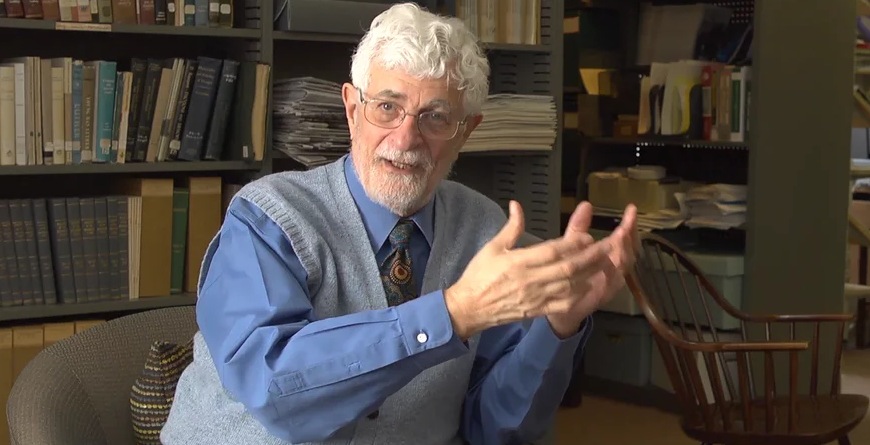By David Swanson, World BEYOND War, August 9, 2021
A new film by Molly Castelloe called “Vamik’s Room,” introduces the viewer to Vamik Volkan and psychoanalysis of international conflict.
The idea is not as mystical as it may sound. There’s no notion that a conflict has a psychology, but rather that those engaged in it do, and that anyone engaged in diplomacy or peace making should be aware of what are often unstated and even unacknowledged motivations in the parties engaged in disputes.
Volkan focuses on large group identity, the frequent pattern of human beings identifying passionately with large — sometimes very large — groups such as national or ethnic identities. The film discusses the dehumanization of other groups that often accompanies large group identity. It also focuses, a bit more surprisingly, on the significance of shared mourning. Whom and how groups mourn, and to whom groups erect monuments, is of critical importance to Volkan’s view of groups around the world through the centuries (not to mention to Black Lives Matter’s critique of the statues dotting U.S. public space).
Volkan provides numerous examples of situations in which diplomats could get nowhere without understanding people’s group trauma. He sometimes refers to “chosen traumas,” though I suspect he hasn’t always called trauma’s “chosen” in discussing them with the traumatized individuals. Of course, “chosen” they are, even if perfectly factual and painful. Choosing what to dwell on and memorialize, often to glorify and mythologize, is a choice.
To take one example of many in the film (and there are countless others that anyone can think of), Volkan recounts having worked with Estonians and Russians and noticing that when Russians would get upset in their discussion with Estonians they would bring up a Tartar invasion from centuries before. Another example featured is Serbia’s “reactivation” in its culture, following the breakup of Yugoslavia, of the Battle of Kosovo of 600 years earlier. These are chosen traumas. They can also be accompanied — though the film provides much less on the topic — by chosen triumphs and glories.
The film warns of the use of chosen traumas sometimes made by charismatic leaders. Among the featured examples of charismatic leaders is Donald Trump. I would recommend the report made on the last day of his presidency by his 1776 Commission for a model of whitewashing (pun intended) and glorification of past horrors, and his remarks (and those of every other U.S. president) on Pearl Harbor and 9-11 as models of choosing trauma.
This is the point at which people may want to scream “but those things happened!” and one may have to explain that they both happened and have been chosen. The damage and death done in the Philippines within hours of “Pearl Harbor” was significantly greater, but not chosen. The damage and death from COVID 19, or mass shootings, or military suicides, or unsafe workplaces, or climate collapse, or lack of health insurance, or poor diet is significantly greater than either of the big chosen traumas (Pearl Harbor and 9-11), yet not chosen.
Volkan has put his insights to work helping people heal in locations around the globe. To what extent diplomats and peace negotiators as a whole have learned from him is less clear. Weapons sales and foreign bases and aircraft carriers and drones and missiles and “special forces” and warmaking are all dominated by the United States, which openly awards ambassadorships to campaign “contributors,” uses the State Department as a marketing firm for weapons sales, and bases its foreign policy on the pleasure of a military industrial complex. One wonders whether what diplomats need most is deeper understanding of human motivations or replacement by other people who actually give a damn and have any intention of ending war.
One way to accomplish such a replacement might be to change U.S. culture, to overcome chosen traumas and glories in U.S. mythology, to abolish U.S. exceptionalism. Here, Volkan and Castelloe’s film offer some direction by analyzing U.S. large group identity.
However, the film declares that the trauma of 9-11 is now inevitably a part of that identity, without acknowledging that some of us in the United States must then exist outside of it. Some of us were horrified by wars and atrocities and terrorism on a much larger scale long before and long after September 11, 2001. We were not particularly traumatized by the fact that people were murdered on that day in a certain geographic area. We identify with both humanity as a whole and with various small groups more strongly than we do with the nationally designated large-group specified by the first-person plural in U.S. government statements.
This is where I think we can build on what this film tells us. Volkan wants diplomats to understand and be aware of and investigate large group identity. I want them to also outgrow it. Needless to say, understanding it is helpful in outgrowing it.
I’m delighted to have learned about Volkan from this film, and recommend you do so as well. I’m ashamed to say that I believed the University of Virginia to be a bit more dominated by pro-war speakers and professors than it turns out to be, as Vamik Volkan is a professor emeritus there.









